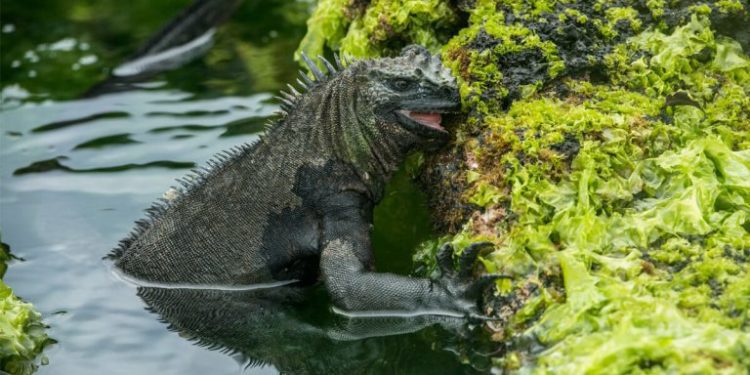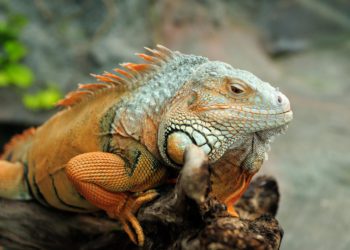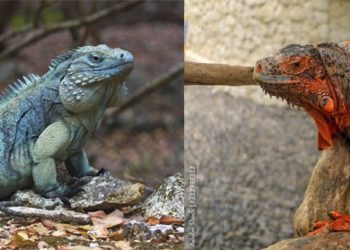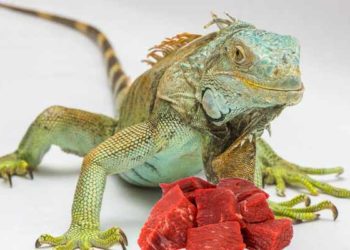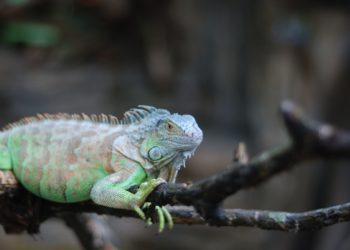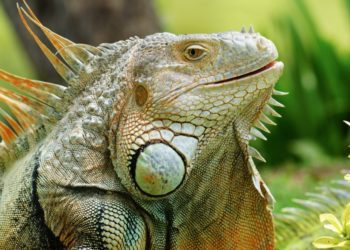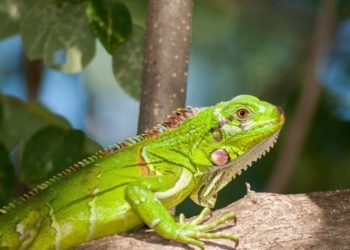Marine iguana who are also commonly known as the sea iguana are from the family of iguana that belongs to the reptile species. These marine iguana basically feed on marine algae and the seaweed that are usually found in the ocean.
Marine iguana are found mostly in oceans and that is why their food preferences should be depending on that. Also they are the only lizards that spend time in the ocean and that is why the food which is basically found in the oceans are the best food for the marine iguanas and they usually feed on ocean algae and seaweeds. In this article we will discuss about the best food for the marine iguana. We have discussed about iguanas food in this guide earlier.
Contents
What do marine iguanas eat?
The marine iguanas mostly known to eat marine algae and seaweed that is usually present in the ocean and this the primary diet of the marine iguana. You can find at least 9 different kinds of algae in the ocean on which the marine iguana feed on and they are mostly fond of red algae that are found on the islands and which comprises of 4 to 5 species of algae.
When the red algae or you could say the preferred species of algae is not found only then they go for other species or when there is shortage of food then they have to switch for alternative species of algae that is least preferred by them out of the 9 species of algae.
The marine algae also the most preferred food by the marine iguana because it grows on rock that are near the shore, so they do not have to dive deep in to the ocean and risk their life so get the algae, therefore 5% of marine iguanas go so deep in the ocean for the marine algae. Rest all the marine iguanas stay near the sea shore and feed on the available algae over there.
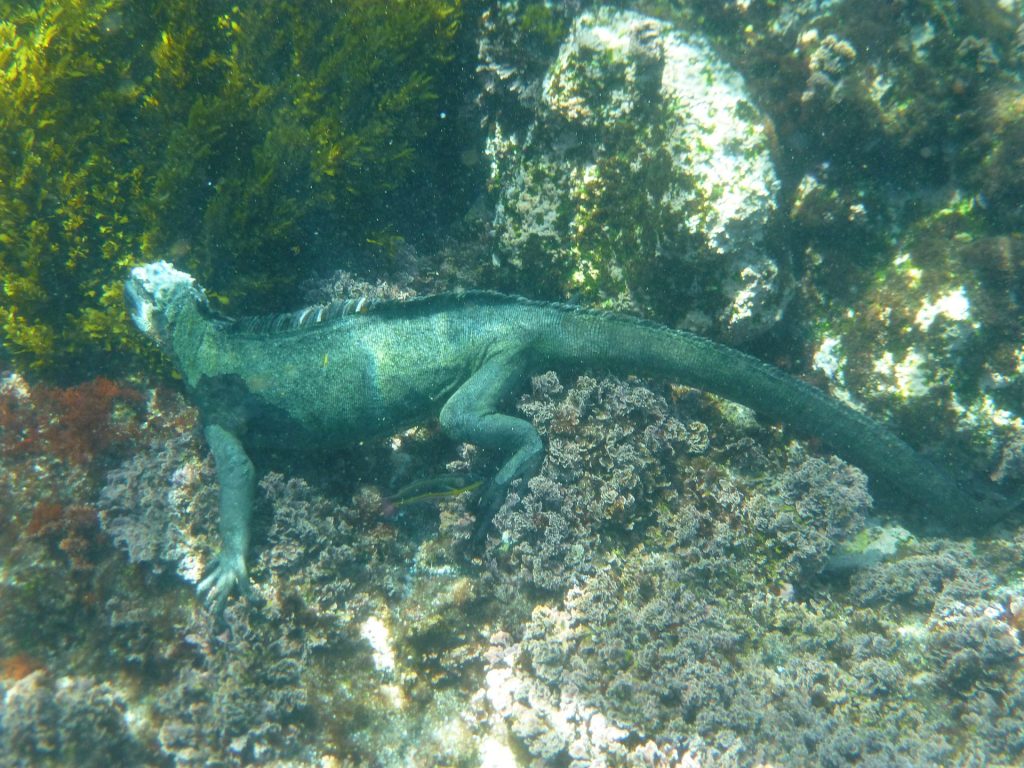
Other foods
When there is shortage of food or there is no algae around in the ocean then they have to go for the other food options, which includes crustaceans (prawns, crabs, shrimps, lobsters, etc.), seahorse afterbirth and grasshoppers.
In some cases if there is too much shortage of food they even go for eating faeces and they go for excreta of sea lions, crabs and also the other marine iguana and this is done in order to survive in extremely worst conditions in the oceans. Though these food options are not a favourable food option but to survive they have to go for such options, otherwise they can die due to hunger.
The quest for food
The marine iguana has to do lots of things in order to get their favourite food or the most favourable food and that is the marine algae and when there is shortage of algae then they have to dive deep in to the ocean or the seas, they are known for foraging and that is why they have to go far in search of food and they do take risk to get the marine algae for eating.
Marine Iguana foraging
The marine iguanas are known for foraging of food and this is also the reason they are called the marine iguanas. They forage the food so that they are able to overcome the times when there is shortage of food basically the algae and that is why they forage the food.
The marine iguana are the only animals in the reptile kingdom that have this unique habit of food foraging and that is also why they are an amusement for the scientists and also the tourists.
Deep Diving for food
The marine iguanas especially the male marine iguanas can dive up to 30 metres that is approximately 100 feet deep in order to search the marine algae and to forage it.
Only the marine iguanas that are stronger and can even swim in the tides can take up this risk. The female iguanas and the young marine iguanas stay closer to the sea shore and do not deep dive as this is something quite risky and they feed on other food available for them over there.
The other reason that they dive too deep in to the oceans or the sea is that there is less completion for the food over there and also only 5% of the marine iguanas dive so deep for the food basically algae and that also large and strong males only who can dive for up to an hour.
This is the another unique feature of the marine iguanas that they take so much risk for the food and they dive too deep which is not a common feature in a reptile. As we know that the deep diving in the cold ocean is not a joke and that also for the cold blooded marine iguana, but still they overcome this difficulty and take the risk for the most preferred food i.e. the algae.
Feeding Habits of Marine Iguanas
The marine iguanas are different from the other iguanas and their body have adapted to the island lifestyle and have a body that can swim easily in water due to the flatter tail that is not present in other iguanas.
Their do have extra- long claws in order to give them a grip on rocks in the ocean beds and they can also hold themselves underwater for long time period for the purpose of feeding and also foraging the food.
The other unique feature in the marine iguana is that they have nasal salt glands and the reason is simple when the go under water they intake lots of salt water which can cause dehydration, in marine iguanas so in order to prevent this they expel salt water through these nasal salt glands and this helps the marine iguanas to stay longer inside the water for the feeding purpose. The salt is removed from the body through these glands and no dehydration takes place in their body.
Final Thoughts:-
The marine iguanas are the unique creation of nature and they are very much different from the terrestrial iguanas as they have adapted their body to survive in the marine ecosystem. The marine iguanas are algae lovers and that also red algae is their favourite.
But due to the shortage of the food they have to shift to other food choices which are not so good and they have to just eat them for the survival reason. They switch on to grasshoppers, crabs, shrimps, lobsters, etc. even though they do not like eating them, but food shortage make them do so.
Some of the marine iguanas that only comprises 5% of the total population do take the risk of diving deep in to the ocean in search of algae and this risk is mostly taken by the strong male marine iguanas. The unique quality of foraging the food is also found in the marine iguanas and the reason is simple as they are aware about the food crisis that can occur any time so they should be already prepared for such situations.
The marine iguanas have always been an amusement for the scientists and also the tourists and the most amazing fact about the marine iguanas is that they do not have as such nay natural predator.
Also Learn:


